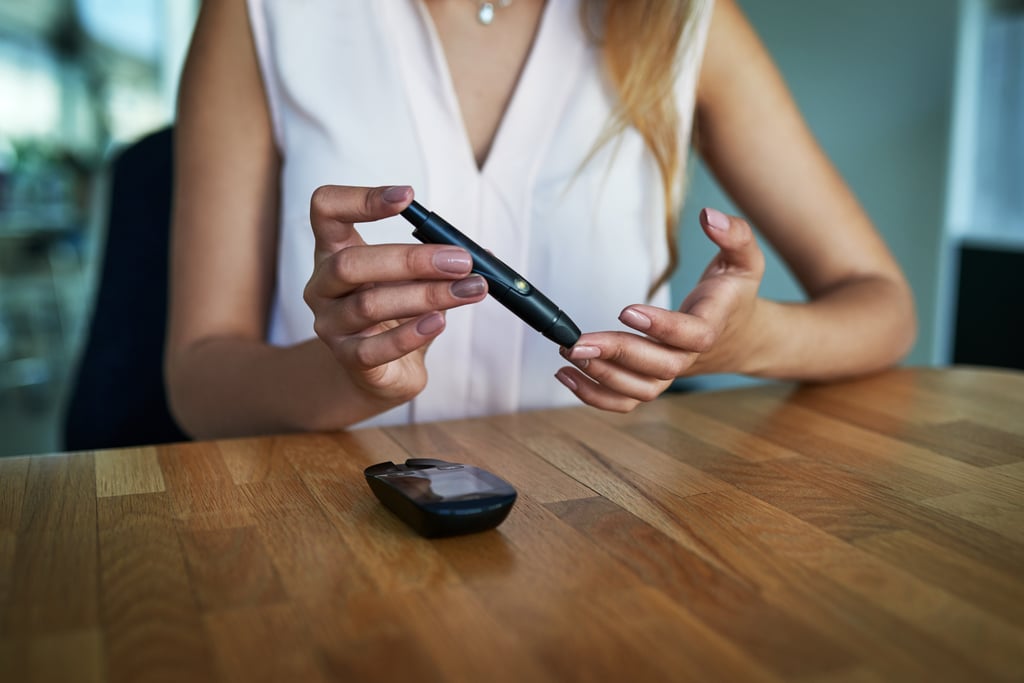Before we dive right in, let's discuss a few things you need to know about fat (yes, fat!) first. It can accumulate as your metabolism slows down with age [1]. It can also result from a poor diet and lack of exercise. But hormone changes in the body can actually lead to belly fat specifically, and we spoke to two endocrinologists about why that is and what might be the cause.
Rocio Salas-Whalen, MD, board-certified endocrinologist at New York Endocrinology [2], said that belly fat is commonly associated with visceral fat, meaning fat that attaches to the liver, pancreas, and other internal organs. It's not just what you can pinch with your fingers that causes worry, she explained, it's what can accumulate underneath. And your family history may predispose you to belly fat [3] as well as metabolic problems we'll discuss later.
Jaime Knopman, MD, board-certified reproductive endocrinologist at CCRM Fertility [4], explained that women can be very sensitive to fluctuations of estrogen, progesterone, and other hormones, which will change the way their bodies burn and store fat. And, she said, women tend to store fat in their lower abdomen. In addition, when the stress hormone cortisol is elevated chronically, it can lead to "abdominal or visceral fat," Dr. Salas-Whalen explained, though she noted this goes for overall weight gain, not just belly fat.
But how do you know if this fat is caused by hormones? If you're eating a well-balanced diet and exercising but still gaining weight in that area, this might be a sign that you should contact your doctor, both endocrinologists agreed. Ahead, check out why women of certain ages may develop belly fat due to hormone fluctuations and read more about underlying conditions that could be associated with this buildup. Many of the potential causes, like PCOS and metabolic syndrome, have to do with insulin resistance [5] (which we'll also discuss later).
Menopause
When a woman goes through menopause, the hormone changes — especially the decrease in estrogen [7] — can lead to weight gain and belly fat [8], Dr. Knopman said. However, Dr. Salas-Whalen said that, in her experience, weight gain in older women doesn't necessarily correlate with menopause; it can also result from a slower metabolism in general.
Men metabolize their food differently because they don't have as many hormonal fluctuations, Dr. Knopman said. But they do gradually go through andropause [9], she explained, "which is when their testosterone levels decrease, and they can also start to gain weight [10] in their stomach area."
IVF
Dr. Knopman said hormone changes while a woman is undergoing in vitro fertilization, or IVF [11], can also contribute to weight gain [12]. "Oftentimes they will be taking gonadotropins, which are hormones [13] that cause you to produce excess estrogen and then, after you ovulate, excess progesterone," she explained. And, she said, women can experience fluctuation in weight up to four or five pounds during an IVF cycle [14].
To learn more about IVF, head over to the CCRM website [15].
PCOS
Polycystic ovarian syndrome, or PCOS, affects six to 12 percent of women [16] who are in their childbearing years, according to the CDC. It's a condition in which the ovaries or adrenal glands produce too much of the male hormones [17], and common symptoms are irregular periods, acne, thinning or excess hair growth, and unwanted weight gain, belly fat included. (View more about these symptoms here [18].)
PCOS can be characterized by insulin resistance, Dr. Salas-Whalen said. "In insulin resistance, cells and muscles stop absorbing glucose as efficiently and more glucose stays in the blood [19]," Rebecca Elbaum, RD, CDE, explained to POPSUGAR in a previous interview. "The body then needs more insulin to absorb glucose so that it can be delivered to the cells. Eventually, the cells that secrete insulin fail to keep up with the body's need and blood glucose builds up in the bloodstream and stays elevated." This can predispose you to complications like prediabetes and type-2 diabetes.
For more information on PCOS, you can head over to the PCOS Awareness Association website [20] or The Endocrine Society's hormone.org [21].
Metabolic Syndrome and Diabetes
Dr. Salas-Whalen stressed that belly fat — both in men and in women — can be a sign of metabolic syndrome, which, she noted, along with PCOS, can put you at a higher risk of developing diabetes [22] and cardiovascular diseases. Metabolic syndrome is diagnosed when you have a cluster (at least three) of metabolic disorders [23] such as high blood pressure, obesity, and high fasting glucose levels, according to the American Heart Association.
"Fat that accumulates in the belly usually accumulates on the liver," Dr. Salas-Whalen explained, so a doctor can actually identify what a fatty liver looks like. "There are also things that we can see in your blood that tell us that this belly fat is creating problems before you develop diabetes or anything like that," she said, such as elevated liver enzymes.
For more on diabetes and metabolic syndrome, check out diabetes.org [24] and heart.org [25].
A Note on When to See a Doctor
If you are maintaining a healthy lifestyle but you're having trouble losing weight, it might be a good idea to contact a doctor, Dr. Knopman said. Gaining weight as you age is common, but belly fat specifically can be a red flag. If you have a tendency to gain weight in your belly "like your body's in an apple shape," Dr. Salas-Whalen said, that's something you can go to your primary care physician about.
"Or, go directly to the endocrinologist just to have yourself tested for your cholesterol, glucose, and blood pressure because of the health problems that we see associated with that type of weight gain," she continued. It's one thing to go through menopause and see belly fat, but if you've developed any of these underlying conditions, you may need treatment.





